Decoy Zero Read online
Page 2
And in the second instant, eighteen kilometers away, the garbage barge exploded. Even from this distance the force of it made him shudder. One moment the barge was barely on the horizon, even with binoculars; the next, it was a fiery burst arcing into the sky, pieces of it sailing in various directions for hundreds of meters, lighting up the early hours of the morning.
And, seconds later, those flaming pieces sizzled and sank in the freezing waters of the North Pacific Ocean.
In moments like this, many great men had the aptitude of foresight to prepare a statement, knowing or at least suspecting that their quote might appear later in a history text, or regurgitated on the internet, or at the very least noted by another who was present. But Eun-ho had prepared no statement, and in that moment only one syllable escaped his throat.
“Huh.”
The test had gone spectacularly well. The damn thing worked perfectly. Where there once was a barge, there was now nothing at all but frothing waters. The destructive force of the railgun was immense—not nearly that of a warhead, but it was not an explosive weapon. It was a tactical weapon, a precise weapon; its goals were small, more strategic, and could even be mobile. The railgun would be most adept at sinking ships, shooting down planes, or even defending against missiles. Its ability to course-correct almost instantly and the plasma projectile speed of Mach 7 made it virtually impossible to defend against. Its only disadvantage was the eight seconds it took to charge before firing, and even that paled in comparison to long-range missiles, torpedoes, or battleship cannons. Its relatively small size lent to mobility, and stealth capabilities meant that it could go virtually unseen by any enemy, even at close proximity.
The plasma railgun could change the face of modern warfare. But that was not its intention, at least not as far as Eun-ho and his colleagues had been told. Despite the many billions it had cost to create the weapon (South Korea had the tenth-highest military budget in the world) they would produce five more, and together the half-dozen railguns would protect not only the border between them and those to the north, but any would-be enemy or invader. They did not seek to become a stronger military power or to destroy anyone who was not an aggressor; it was about protection, safeguarding their people, and nothing more.
And he, Eun-ho Park, was among those responsible for the welfare of his people. He had helped make such a thing possible. Even the biting wind of February on the ocean could not detract from the immense feeling of pride swelling beneath his parka—
“Dr. Kim!” the man behind the console shouted suddenly. “A boat!”
Eun-ho’s head swiveled quickly at the distressing call, and his eyes widened when he saw that the man was not looking at the radar display of his console—but pointing over the bow. A boat was indeed approaching, no more than fifteen hundred meters out and bouncing on the white-tipped crests as it closed the distance.
The weapon’s test had distracted them all from keeping their eyes open. They had assumed they were safe out here.
“What the hell?” Dr. Kim grunted. “Who…?”
Eun-ho realized then that he still had Sun’s binoculars in his hands. He lifted them to his face and focused in. He did not know much about boats, but enough that he could tell the approaching ship was not military, nor was it nearly as new as Glimmer. The chipped and faded hull told him that this boat had been through some wear and tear… and were those bullet holes in its sides?
He looked to the deck and nearly gasped aloud. The men gathered there were dressed for cold weather, but the exposed areas of their dark skin told him that they were African. And the guns cradled in their hands told him that they were not friendly.
Eun-ho did not know much about boats, but he knew loads about weapons, and he recognized an AK-47 when he saw one.
“Sir,” he said meekly to Kim. “I don’t know how to explain this, but I believe they are… pirates.”
“Give me those!” Kim all but snatched the binoculars from Eun-ho’s hands. The balding doctor’s jaw went mildly slack even while the lenses were still against his eyes.
Of course they had all heard tales of modern pirates, particularly those that hailed from Somalia. But they were a territorial lot, their victims being those that sailed the Gulf of Aden, the Arabian Sea. Certainly not the North Pacific. They were thousands of miles from their hunting grounds.
The German was on his feet then, staring off the bow with an eagle-eyed squint. He unclasped the nylon holster at his waist and drew the matte black gun in such a fluid motion that it seemed like the weapon simply appeared there in his hand.
But it was Sun who spoke next.
“Turn the weapon on them.”
Dr. Kim wheeled on him with a look of utter incredulity. “Are you mad? You would have us simply kill them?”
“They have guns,” the German murmured. “Assault rifles.”
“They’ve seen,” Sun insisted. “They saw us fire the weapon, and they are coming for it. There is no doubt. Turn it on them.”
A lump of panic congealed in Eun-ho’s gut. It was strange to think that after all of this time and research, he had never once considered that this masterpiece of a weapon might be used to end lives. He would be a part of that. His own hand had crafted the projectiles. Yet here they were, faced with a genuine threat and little other recourse.
“You have about fifteen seconds to decide,” the German announced in his harsh accent, louder than any words Eun-ho had heard him speak before.
“No,” Kim said firmly. “We can outrun them easily. Get the engines going!”
“We need to lower the weapon first…” stammered the man at the console.
“Then do so!” Kim screeched. “Now, quickly!”
“But they have seen!” Sun insisted again.
“Ten seconds,” the German interjected.
A burst of automatic gunfire tore at the air, so loud and crisp over the water that Eun-ho instinctively threw his hands over his head. He felt the thrum of the hydraulic lift lowering the plasma railgun back into the confines of Glimmer’s hull. He heard the shouts—the panicked, argumentative ones of his colleagues, but now others, guttural and angry and unintelligible to his ear, speaking a language that was not Korean or English or Mandarin, which Eun-ho was also fluent in, but sounded angry and demanding and deadly all at once.
When he dared to look again the pirate skiff—for he had made the mental assumption by now that they were indeed pirates—had drawn nearer and slowed, pulling perpendicular to Glimmer’s bow so that moving forward would be impossible.
“Full reverse, now!” Kim snapped as the hatch doors closed over the railgun.
The man at the console wrapped his hand over the throttle as a single, sharp report made Eun-ho’s shoulders jump. The pilot’s head jerked to the right as a cloud of red mist settled over the sea behind him.
The German lowered his pistol. The silence and incredulity of the ensuing moment was crushing; the man at the console slid to the deck. The pirates watched. Eun-ho’s colleagues fell absolutely still. His legs felt as if they were made of stone, rooting him to the ship’s deck.
And in that vacuous moment, the German turned and dispassionately fired a second shot into Dr. Kim’s forehead.
That jarred them into action. Several shouted. Two rushed forward, Sun and another man—Bong, if Eun-ho recalled correctly. They reached for the German but he simply twisted his body and, instead of bothering with the pistol, he threw out an elbow. It connected with Sun’s nose with a sickening crunch, blood arcing backward with the toss of his head and spattering the front of Eun-ho’s parka. With the same smoothness that he had drawn his weapon, the German spun the pistol in his palm, bringing it around at the same time, and caught Bong just behind the jaw with its grip.
Eun-ho’s legs turned to jelly and his knees buckled, sending jolts of pain through his legs as they struck the deck. Two more shots rang out, pop-pop in quick succession, and even though he had closed his eyes by then the telltale sound of two bodies fa
lling followed.
There was a splash, and then another—colleagues that had chosen “flight” as their fight, flight, or freeze option. But even as terror coursed through Eun-ho, he knew that ultimately they had chosen the latter—freeze. In the frigid North Pacific in February, they would be dead in less than a minute.
Pop.
Pop-pop.
These were not the tearing bursts of automatic weapons; these were the single shots of the matte black pistol. The pirates were not firing, he realized; they were waiting. Waiting for him to finish so that they could claim the railgun. The German had betrayed them. The man who had been responsible for their safety had been their undoing.
When at last Eun-ho mustered the courage to open his eyes again, Glimmer’s deck was awash in blood but still spotless white in others. Four of the African pirates had boarded, pairing off and tossing the bodies of his colleagues over the side.
The German stood beside him, the pistol loosely and casually gripped in his left hand as if it was a mere accessory.
“Why?” Eun-ho asked, or tried to. But all that escaped his throat was a breathy hiss.
“Just a young man,” the German murmured, his voice soft again, sounding much the way it had when Eun-ho had erroneously guessed he was Dutch. “But it is often young men that suffer most in these sorts of matters.”
Eun-ho could not help but flinch slightly as the barrel of the gun pressed against his temple. He closed his eyes again. The breeze was cold, but the morning sun felt pleasant on his face.
CHAPTER ONE
Zero lay on his stomach in the snowdrift, hoping that he was low enough to the ground and far enough from the cabin to be obscured as the sun set across the prairie. He cursed the lack of foresight to wear white; the fleece-lined synthetic jacket was beige, close enough in theory but undoubtedly standing stark against the pure-white snow. The balaclava over his face was black because—well, because it was difficult to find one that wasn’t black, especially on as short notice as he had.
He held the monocular to his eye again and scoped the cabin in the distance. Still no movement. But he was certain this was the place; the question was whether or not his target was inside at that moment.
Zero wished he had better gear. He was only vaguely aware of what he might be walking into, and none of it was good. He had the cold-weather clothes on his back. He had the monocular. He had a gun, a small silver Walther PPK with a three-point-three-inch barrel and a six-round capacity. Many believed that the PP series stood for “pocket pistol,” since they were so easily concealed, but it actually stood for Polizeipistole—quite literally, “police pistol”—which was made all the more amusing by the fact that it was currently concealed in his right jacket pocket.
Zero had no radio, no motion detectors, no listening devices, not even a phone. The CIA could track him by phone… or perhaps more dangerously, his daughter Maya could track him by phone. She hadn’t believed for a second that he was seeing a nerve specialist in California for the traumatic injury to his hand from a couple years earlier. As usual, she was right.
Zero was not in California. He wasn’t even in the United States. Instead, he was lying half-buried in a snowbank in the northeastern corner of Canada’s Saskatchewan province. Thanks to having to resort to paper maps and pens, he had only a nebulous idea of where he actually was in relation to anything else. The landscape was little more than a wide swath of prairie as far as the eye could see, marred only by snow that had been arranged by wind into small ridges of drifts here and there, and the occasional leafless tree.
And, of course, the cabin.
It sat about five hundred yards away from his current location, just a single-story modular affair that looked neither old nor modern. It was roughly the size and shape of an eighteen-wheeler’s trailer (which Zero surmised was how it had arrived here) and had been unceremoniously propped upon a foundation of cinder blocks, some of which seemed to have settled since the cabin’s weight had set upon them, causing the building to sit at an angle of about three degrees.
To the cabin’s eastern side Zero could see a stainless steel cistern, which must have been collecting melted snow and groundwater. Even at his distance he could hear the faint rumble of a diesel-powered generator, though he couldn’t see it from his vantage point. And there were clearly two small solar panels on the roof. The cabin was small, self-sustaining, and almost completely off the grid.
Almost, or else he might never have found it.
After what felt like hours the sun finally vanished behind the horizon, darkening the plain enough that Zero felt comfortable moving. He was thankful for that, because the night brought with it a plummeting temperature that bit into him even with his cold-weather precautions. Northern Saskatchewan in February was anything but forgiving.
Before carefully setting off toward the cabin, he did a quick mental check. It was an exercise that he’d started doing daily, and then almost hourly, and now just second-naturedly to ensure that his memory was not slipping or failing. First he thought of his daughters, Maya and Sara, eighteen and sixteen respectively. In his mind’s eye he brought up their names, their faces, their ages, the sound of their laughter. Then he thought of Maria Johansson, her cascading blonde hair and slate-gray eyes that somehow managed to look flat and bright at the same time. And finally, he thought of Kate, his late wife.
“Kate.” He actually murmured her name aloud, more out of ceremony than anything else, like an “Amen” punctuating a brief prayer; her name was the first thing he’d forgotten when his latent memory lapses began to crop up. He remembered her name. He remembered her face. Her scent, her laugh, and the tiny hiss of fuming breath when she was irritated. He remembered that she was murdered by a former CIA agent named John Watson, a man Zero had once called a friend. A man who had fled and gone dark after Zero had decided not to kill him.
And then he moved, slowly and carefully making his way toward the cabin, stepping heel-toe and shifting his weight with each footfall. He couldn’t do much about leaving tracks in the snow, but at least he could keep his steps from crunching.
The exercise, the “mental check” as he was calling it, was about more than just ensuring he hadn’t temporarily lost anything. A little over eight weeks ago, he had visited the Swiss neurologist Dr. Guyer, the same man who had implanted the memory suppressor in his head in the first place, as well as the man who had told Zero, in no uncertain terms, that his brain would continue to deteriorate at an unknown rate, that his memories would fade and potentially vanish forever, and that the damage to his limbic system would, in all likelihood, eventually kill him.
All of which lent greatly to his reason for stalking a remote cabin in Saskatchewan at night in the dead of winter. He needed to go back to the beginning, to seek out someone who could give him more answers. At least he hoped.
He paused about fifty yards from the cabin and lowered himself to one knee, staying like that for several minutes, completely silent and watching. Zero saw no lights on from within. Conserving energy, perhaps? Or maybe the windows were boarded. Maybe there was no one home. But he could hear the chugging of the diesel generator even clearer now; if there was no one inside, why would it be running?
Zero rose to his feet and stalked forward again. Though it was night, he could still see the exterior façade of the cabin and did not notice anything like cameras or detectors or perhaps automated gun turrets that would tear him to shreds the moment he stepped into their sensor range. As ridiculous as it sounded, it was a legitimate concern, considering his target.
He realized then that his hand had slipped into his pocket and was gripping the PPK. He released it. He wouldn’t need the gun, not here. He’d only brought it as a precaution.
But as Zero reached the front door of the cabin, he was keenly aware that this was as far as his careful planning would take him. He’d imagined the scenario a hundred times, especially with the hours he’d spent lying in the snow drift, but had no way of telling what was waiti
ng on the other side of the door. If this was an assault, it might have been easier; ordinarily he would burst in, gun drawn and ready for anything. Shoot first and ask questions later.
This time, however, he simply twisted the knob. It turned easily, unlocked. He pushed the door open and took a small, cautious step over the threshold. As he’d suspected from the outside, the cabin was entirely dark. But still the generator hummed from somewhere behind it.
This is a trap.
No sooner did his brain remit the message than he took another small step forward. The tile under his foot gave way just slightly, no more than a quarter of an inch.
A pressure plate.
Zero froze.
“I wouldn’t lift that foot if I were you.” The voice was familiar, yet seemed to come from everywhere, as if it was cast through an omni-directional microphone. “Put your hands up, please.”
Zero did as the voice told him. “I’m not armed,” he said, but hours of being silent and out in the cold had made his throat tight and his voice hoarse.
“You are,” the engineer contradicted simply. “You’ve been lying in a snowbank for about four hours. There were hidden cameras on you from two of the trees. A large rock you passed about a hundred yards out was actually a full-body scanner. You have a pistol in your right jacket pocket. Just keep your hands up and your foot down.”
A light clicked on, a bright white LED that made Zero squint. Beyond it, a silhouette appeared from a small rear room.
“Bixby,” Zero said.
The silhouette paused.
Slowly Zero reached up and did what he should have done before he’d even entered the cabin; he grabbed the fabric of the balaclava and tugged it off his head. His hair was matted and stray wisps were plastered to his forehead with sweat.
“Oh,” said Bixby. The disappointment in his voice was palpable. “I didn’t think they would send you. But I guess I should have figured.”

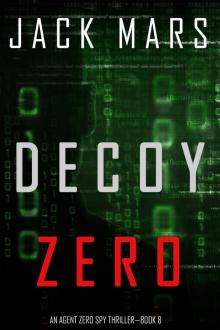 Decoy Zero
Decoy Zero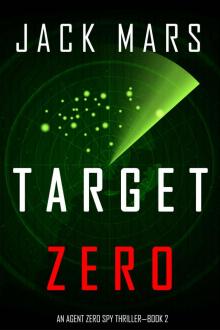 Target Zero
Target Zero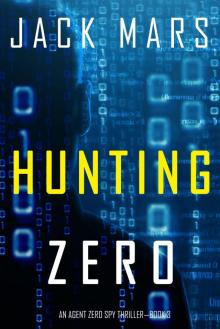 Hunting Zero
Hunting Zero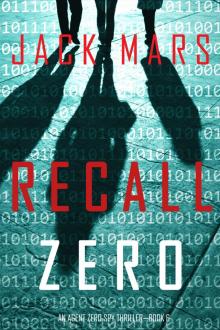 Recall Zero
Recall Zero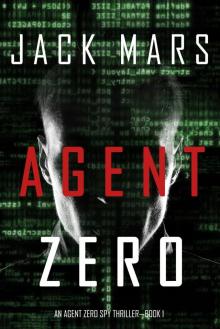 Agent Zero
Agent Zero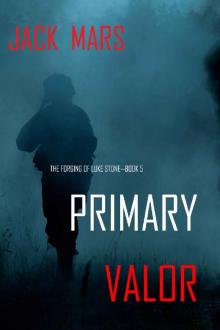 Primary Valor
Primary Valor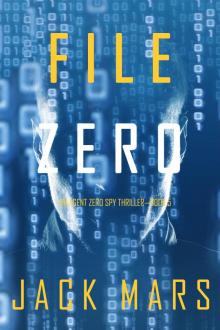 File Zero
File Zero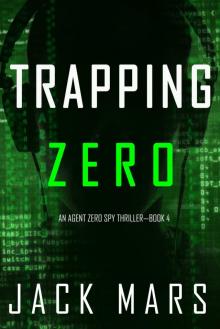 Trapping Zero
Trapping Zero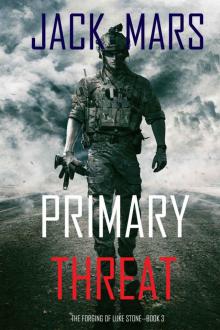 Primary Threat
Primary Threat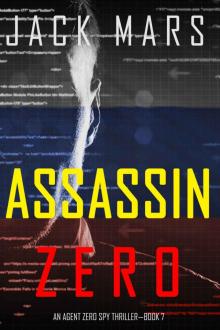 Assassin Zero
Assassin Zero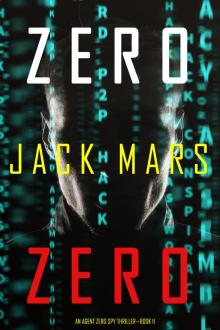 Zero Zero
Zero Zero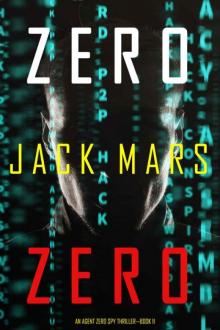 Zero Zero (An Agent Zero Spy Thriller—Book #11)
Zero Zero (An Agent Zero Spy Thriller—Book #11)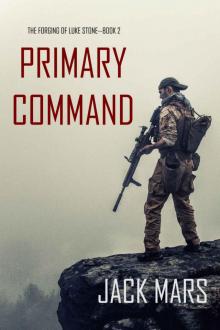 Primary Command
Primary Command![[Luke Stone 02.0] Oath of Office Read online](http://i1.bookreadfree.com/i/03/21/luke_stone_02_0_oath_of_office_preview.jpg) [Luke Stone 02.0] Oath of Office
[Luke Stone 02.0] Oath of Office House Divided
House Divided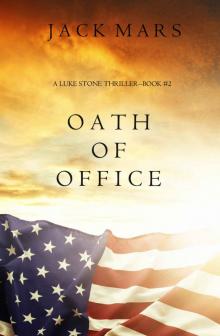 Oath of Office (a Luke Stone Thriller—Book #2)
Oath of Office (a Luke Stone Thriller—Book #2) Our Sacred Honor (A Luke Stone Thriller—Book 6)
Our Sacred Honor (A Luke Stone Thriller—Book 6)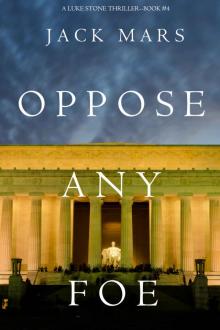 Luke Stone 04 - Oppose Any Foe
Luke Stone 04 - Oppose Any Foe Our Sacred Honor
Our Sacred Honor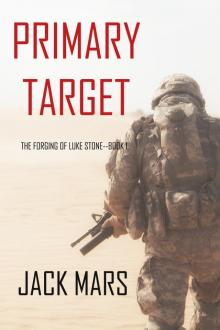 Primary Target
Primary Target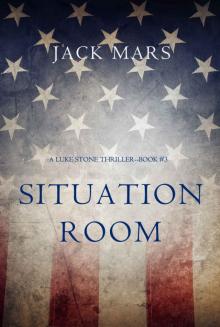 Luke Stone 03 - Situation Room
Luke Stone 03 - Situation Room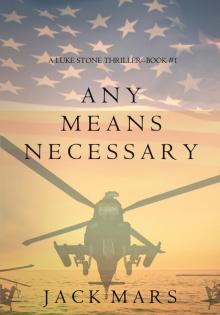 Any Means Necessary: A Luke Stone Thriller (Book 1)
Any Means Necessary: A Luke Stone Thriller (Book 1)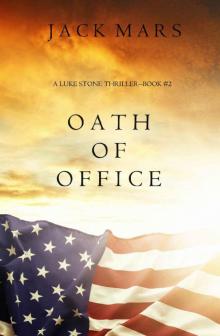 Oath of Office
Oath of Office